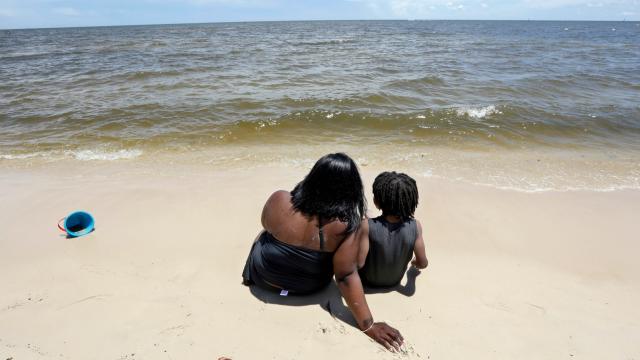An unusually large bloom of toxic blue-green algae has prompted the closure of all beaches along the Mississippi coastline in the United States. Officials are attributing the bloom to excessive rainfall and overuse of fertilisers.
On Monday, the Mississippi Department of Environmental Quality, through its Beach Monitoring Program, announced the closure of two more Mississippi beaches, namely Pascagoula Beach West and Pascagoula Beach East.
The total number of Mississippi beaches now closed to swimmers is 21, which is all of them, as CBS News reports.
The rapidly growing blue-green Harmful Algal Bloom (HAB) is being fuelled by freshwater streaming in from the mainland. In a statement, MDEQ advised “people, and their pets, to avoid water contact such as swimming or wading because exposure to the blue-green HAB can be harmful.”
The beaches are not completely off limits to visitors, who are still able to make use of the sandy portion of the beach, and engage in activities such as sunbathing or volleyball.
“The algae can cause rashes, stomach cramps, nausea, diarrhoea and vomiting,” according to the agency statement. “MDEQ advises that those exposed wash with soap and water and to not eat fish or any other seafood taken from affected areas.”
Technically speaking, blue-green algae is not actually algae, but rather a cyanobacteria that produces toxins. This bacterium multiplies a lot during the summer, resulting in massive growth spurts known as blooms.
At high densities, these unsightly growths look like surface scum, and they can give water a bluish-green or greenish-brown appearance. These blooms also smell awful, like rotting garbage, according to the Ontario parks ministry.
As CBS News reported, the major contributing factor behind this year’s unusually large bloom has to do with the excessive amount of rain that feel on eastern North America during late winter and early spring.
As a result, officials are having to release copious amounts of fresh water into the ocean from the Bonnet Carré spillway in Louisiana. The spillway had to be opened on February 28 and wasn’t closed until April 12.
Ongoing rain forced a second opening on May 11. The spillway has remained open since then, releasing freshwater into the Gulf of Mexico at rates in excess of 100,000 cubic feet per second. For comparison, the Bonnet Carré spillway was open from March 9 to March 31 in 2018, and not at all in 2017.
All this water streaming in from the mainland is carrying valuable nutrients to the blue-green algae, including phosphorus and nitrogen. Much of this is coming from fertiliser. John Lopez from the Lake Pontchartrain Basin Foundation told CBS affiliate WWLTV that the Bonnet Carré spillway will likely be closed later this month, and that once they shut it down, “conditions will start to change pretty quickly,” with the blue-green algae going into decline.
The excessive rain and the opening of the Bonnet Carré spillway has also affected dolphins in the region. Since February, over 260 bottlenose dolphins have been found dead on beaches along the Gulf Coast, bearing lesions and other signs of exposure to low-salinity waters.
